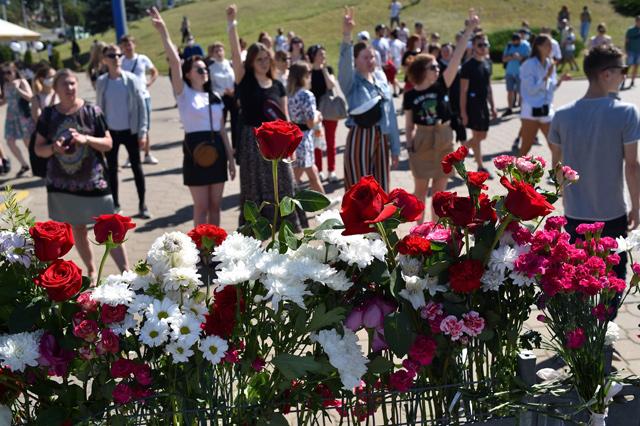You are here
Lukashenko challenger flees to Lithuania
By AFP - Aug 11,2020 - Last updated at Aug 11,2020

People gesture during a gathering at the site where a protester died last night in Minsk on Tuesday (AFP photo)
MINSK — The main challenger in Belarus’s disputed presidential election said on Tuesday she made a “difficult decision” to leave the country, after a second night of street clashes between police and opposition supporters left a protester dead.
Svetlana Tikhanovskaya, who claimed victory over authoritarian President Alexander Lukashenko in Sunday’s vote, said she had left out of concern for her children.
Lithuania said she was “safe” after going to the neighbouring country.
“I have made a very difficult decision,” a distressed-looking Tikhanovskaya said in a short video.
“Children are the most important thing we have in life,” said the 37-year-old, whose five-year-old daughter and 10-year-old son had earlier been taken out of the country for their safety.
Tikhanovskaya decided to run for president after the authorities jailed her husband, popular blogger Sergei Tikhanovsky, and barred him from contesting the election. He remains in prison in Belarus.
“I know that many will understand me, many will judge me, and many will begin to hate me,” Tikhanovskaya said. “But God forbid anyone face the choice I had.”
Belarusian state media released a second video where Tikhanovskaya urged supporters not to protest or break the law, apparently reading from a script.
Maria Kolesnikova, one of Tikhanovskaya’s campaign partners, said “we think this video was recorded under pressure from law enforcement authorities.”
The political novice, who has energised Belarus’s opposition, disappeared on Monday night after spending hours at the central electoral commission.
The Belarusian border guard service posted a video it said showed her crossing the frontier in a car at around 3:30am (00:30 GMT) Tuesday.
Lithuanian Foreign Minister Linas Linkevicius told AFP Tikhanovskaya had arrived in the EU member country and “is safe”.
EU and NATO member Lithuania, which like Belarus was once part of the Soviet Union, has a history of granting refuge to Belarusian and Russian opposition figures.
Tikhanovskaya went missing as thousands protested on the streets of the capital Minsk, after Belarus declared long-serving leader Lukashenko had secured a sixth term with 80 per cent of the vote.
Tikhanovskaya came second with 10 per cent according to the official count but protesters are backing her claim to have won the election.
‘We will not stop’
For the second night in a row, police used rubber bullets, stun grenades and tear gas to disperse demonstrations, though protesters fought back with stones and fireworks and built makeshift barricades, AFP reporters, protesters and witnesses said.
The interior ministry said it detained more than 2,000 people.
The editor of a leading independent newspaper, Nasha Niva, was among those detained, the Belarusian association of journalists said.
The chaotic scenes of defiance with protesters fighting back against police in full riot gear were highly unusual in the authoritarian country.
“Our goal is to overthrow the Lukashenko regime,” Yakov, a 51-year-old engineer, told AFP in Minsk.
He said Tikhanovskaya’s departure would not stop protesters.
“That Tikhanovskaya has left for Lithuania is even better, she is safe there.”
Yan, a 28-year-old paramedic, added: “We will not stop despite police brutality. We are fighting for our right to live in a free country.”
Lukashenko’s opponents also called for strikes, though independent trade unions said they would not compel members to take part.
Dozens of people have been injured in the violence and the first fatality was confirmed on Monday when police said a man died after an explosive device went off in his hand.
The health ministry said more than 200 protesters were in hospital with wounds, including chest and head injuries.
‘Intimidation
of opposition’
Tikhanovskaya’s campaign galvanised the opposition, presenting the strongest challenge yet to former collective farm director Lukashenko, who has ruled Belarus since 1994, brooking no dissent and earning the nickname of “Europe’s last dictator”.
Western governments have condemned the police crackdown, with some in the European Union suggesting it may reimpose sanctions on Lukashenko’s regime that were lifted several years ago.
German Foreign Minister Heiko Maas said the EU could do this “very quickly”.
The White House said it was “deeply concerned” by the violence.
Polish Foreign Minister Jacek Czaputowicz said Warsaw was “ready to act as a mediator” between Lukashenko and the opposition after calling for an emergency EU summit.
Lukashenko was defiant, vowing he would not allow Belarus to be “torn apart” and suggesting protesters were foreign pawns.
“We recorded calls from abroad. There were calls from Poland, Britain and the Czech Republic, they were directing our — forgive me — sheep,” he said.
Related Articles
MINSK — Tens of thousands of Belarusian opposition supporters gathered for the largest protest rally in recent history in Minsk as President
MINSK — Demonstrators massed in central Minsk on Sunday after opposition leaders called for a huge rally to demand the resignation of Belaru
MINSK — More than 700 people were jailed following latest anti-government protests in Belarus, the interior ministry said on Monday, as ange













